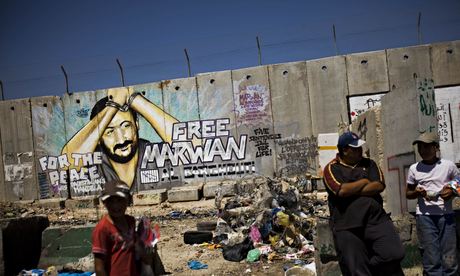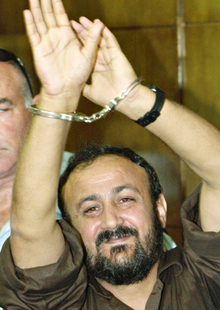Freeing Marwan Barghouti test of Israeli seriousness

Graffiti of jailed Palestinian Fatah leader Marwan Barghouti in the West Bank town of Kalandia, between Jerusalem and Ramallah. Photo by Bernat Armangue/AP
Barghouti’s release a “priority” for Abbas, says prisoner’s wife
By Michel Abu Najm, Asharq Al-Awsat
April 15, 2014
Paris —Palestinian President Mahmoud Abbas remains committed to securing the release of popular Palestinian leader Marwan Barghouti, a “priority” for his government, according to Barghouti’s wife.
In an exclusive interview with Asharq Al-Awsat in Paris during an international tour to raise awareness of her husband’s continued imprisonment, Fadwa Barghouti said: “I have confirmation from the Palestinian leadership that they have called for his release in Washington, and the Palestinian negotiating delegation has made this one of its requirements from the Israeli side for any future political progress. President Abbas has told me that the Marwan Barghouti case is a top priority for him.”
Marwan Barghouti remains one of the most popular Palestinian leaders and is viewed by many as a potentially unifying figure. A leading figure in the first and second intifadas, he was sentenced to 40 years in prison in 2004 by an Israeli court for orchestrating ambushes and suicide attacks. Barghouti denies the charges. He remains a member of the Palestinian Legislative Council, being re-elected while in prison.
His release had been mooted as part of the fourth batch of Palestinian prisoners that Israel was set to release as part of the current faltering negotiations, but Barghouti’s name did not appear on the eventual list of prisoners, who were in the end not released by Israel in retaliation for Palestine seeking to join a number of international organizations.
“Israel believes that arresting Barghouti is akin to arresting the entire Palestinian Intifada. Israel sought to criminalize the Palestinian resistance by criminalizing Barghouti. Releasing Barghouti is a huge political issue, and Israel believes that it is holding an important political card that it can use to blackmail the Palestinians,” his wife added.
Barghouti told Asharq Al-Awsat there were a number of obstacles to securing her husband’s release, but praised the continued efforts of the International Campaign for the Freedom of Marwan Barghouti and All Palestinian Prisoners. The campaign has been gaining momentum in recent months with the ongoing US-brokered Palestinian–Israeli talks. Its members include prominent international figures such as Arab League Secretary-General Nabil Elaraby and South African Archbishop Desmond Tutu.
“The Palestinian president told me that he is doing everything in his power to pressure the Israelis to release him. He told me: ‘If you need him, then you must know that so do I.’ President Abbas believes that Marwan Barghouti’s release from prison would strengthen the Palestinians and Palestinian national unity,” she added.
Release Marwan Barghouti. He can be Palestine’s Nelson Mandela
If Israel really is serious about peace, it will release Barghouti – the one man uniquely placed to negotiate an agreement
By Martin Linton, theguardian.com
March 28, 2014
The death of Nelson Mandela reminds us that often the first step towards the resolution of a conflict is the release from prison of a national leader who has the authority to unite, negotiate and resolve.
Marwan Barghouti has been in jail since 15 April 2002 when Israeli security agents, posing as ambulance workers, seized him in broad daylight and took him to Israel. In 2004 he was convicted by an Israeli court of involvement in five murders, which he denies.
Despite nearly 12 years behind bars, Barghouti remains the most popular politician in Palestine, capable, according to recent polls, of beating either President Mahmoud Abbas or his Hamas rival Ismail Haniyeh for the presidency.
Many believe he could come out of prison, stand for election, win the presidency, unite the Palestinian factions, negotiate a settlement, put it to his people, win their support and then preside over a process of “truth and reconciliation” in a newly independent country.
With the final prisoner release linked to peace talks due to take place on Saturday, and the end of the talks themselves due a month later (on 29 April), this might just be the dramatic gesture that could save the negotiations from ending in total failure. Abbas has offered to prolong them a little, but only if Barghouti and 12 other MPs are released.
Even Shimon Peres, when he was running for the presidency of Israel, declared he would sign a pardon for Barghouti. In the event, the Knesset never approved his pardon because of the vehement opposition of ministers such as Silvan Shalom, who said: “It is out of the question to free an assassin who has blood on his hands and was duly sentenced by a court.”
 Iconic photo by Eitan Hess-Ashkenazi/AP
Iconic photo by Eitan Hess-Ashkenazi/AP
But if peace is ever to come, Israel will have to acknowledge that Barghouti was a political and not a military leader, that he never carried arms and that he always opposed actions targeting Israeli civilians, even while defending the right of Palestinians to resist.
An international campaign has been launched to free Barghouti and the 4,227 Palestinian political prisoners in Israeli jails. It is supported by every party in the Palestinian parliament, with Fatah and Hamas united for once, and by the overwhelming majority of Palestinians.
The campaign was launched in Mandela’s old prison cell by the veteran South African politician Ahmed Kathrada, who started the first Release Mandela campaign back in the 1960s and was then jailed himself and spent 18 years on Robben Island with Mandela.
He will be in London next week to urge British MPs to sign the “Robben Island declaration” in support of Palestinian prisoners, alongside Archbishop Desmond Tutu, former Taoiseach John Bruton, Nobel peace prize winner Mairead Corrigan Maguire, political activist Angela Davis and many others.
For British politicians it should be easy to grasp the essential argument for his release. It is not on the basis that he is innocent (though he may be), or that his arrest was illegal (it almost certainly was), but because he is uniquely well placed to negotiate a peace agreement.
Britain jailed Mahatma Gandhi and Jawaharlal Nehru in 1942, but they released Nehru in 1944 and two years later he was negotiating Indian independence. He became the first prime minister of an independent India in 1947.
In Kenya, Jomo Kenyatta was put in prison by the British in 1952 and released in 1961. One year later the British were negotiating independence with him and in 1963 he became prime minister of an independent Kenya.
In South Africa, Mandela was released from jail in 1990 and within months was negotiating independence with his captors. It took just four years from prison cell to president’s palace and the hope is that Barghouti, now 54, can do the same.
Between August 2013, a month after the talks started, and February this year, 34 Palestinians have been killed and 1,535 injured (in the same period there have been three Israeli deaths and 53 injuries). Meanwhile, 10,509 housing units on illegal settlements have been approved by the Israeli authorities. Is there any wonder the Palestinians don’t want to continue the “peace” talks?
As the 29 April deadline approaches, it would take a really bold initiative by the Israelis to prove they are interested in peace. If they release Barghouti the world will recognise that they are serious. If they refuse, many will conclude they are not.
By Palestinian Mission UK
April 15, 2014
At the occasion of the 12th anniversary of Marwan Barghouthi’s arrest, and as the Palestinian prisoners’ day approaches, the Campaign for the freedom of Marwan Barghouthi and all Palestinian prisoners issued the following statement:
In October 2013, from the cell of Nelson Mandela on Robben Island, an historic international campaign was launched, with the support of official and non-official Palestinian institutions, to call for the release of Marwan Barghouthi and all Palestinian prisoners. In the last 6 months, the Campaign reflected the incredible solidarity with the Palestinian people in general and the Palestinian prisoners in particular.
An International High Level Committee supporting the Campaign, and founded by anti-apartheid icon Ahmed Kathrada, was announced during the launch in South Africa. This International Committee adopted the Robben Island Declaration, founding text of the International Campaign. Within 6 months, the Robben Island Declaration was signed by thousands of people from over 30 countries, including Argentina, Bangladesh, Belgium, Brazil, Burma, East Timor, Egypt, Finland, France, Germany, Ghana, Great Britain and Northern Ireland, Greece, Guinea-Bissau, Haiti, India, Ireland, Italy, Mali, Malta, Namibia, Nicaragua, Peru, Russia, Senegal, South Africa, Spain, Sweden, Tunisia, Uruguay, USA, Yemen.
The signatories include the Secretary general of the Arab League Nabil El Araby; the Deputy President of South Africa and former President Kgalema Mothlanthe; 6 Nobel Peace Prize Laureates from the different continents, including President Jimmy Carter; other former Presidents, Prime Ministers and Foreign Ministers from Italy, Namibia, France, Russia, Malta, Bangladesh, Ireland, Sweden, East Timor, Senegal, Cyprus, Argentina; hundreds of Parliamentarians from across the globe, including several Speakers and former Speakers; former prisoners and human rights figures; internationally renowned artists and intellectuals; religious leaders including Nobel Peace Prize Laureate Archbishop Desmond Tutu and Archbishop Ieronymos II, Archbishop of the Orthodox church of Athens and All Greece; Mayors, trade unions, associations, and over 7000 citizens worldwide.
Furthermore, National Campaigns have been launched in South Africa, Italy, France, United Kingdom, and will soon follow in Ireland, Latin America and elsewhere around the globe.
In this International Year of Solidarity with the Palestinian people, this is a new reflection of the international consensus in support of the freedom of the Palestinian people. This is also a message addressed to Israel, the Occupying power, that occupation must end, and freedom shall prevail, for peace to be achieved, and one of the most important signals of Israel’s willingness to achieve peace is the release of Marwan Barghouthi and all Palestinian prisoners.
The Robben Island Declaration states:
As international efforts led to the release of Nelson Mandela and of all the anti-apartheid prisoners, we believe that the international community must help to secure the freedom of Marwan Barghouthi and all Palestinian prisoners, as an integral part of its moral, legal and political responsibility to assist the Palestinian people in the realization of their rights.
As this message from across the globe is now being heard, including in the occupation prison cells where prisoners pursue their struggle for freedom as an integral part of the emblematic struggle of the Palestinian people for freedom and dignity, the Campaign reaffirms that international values are non negotiable and freedom is inevitable.
